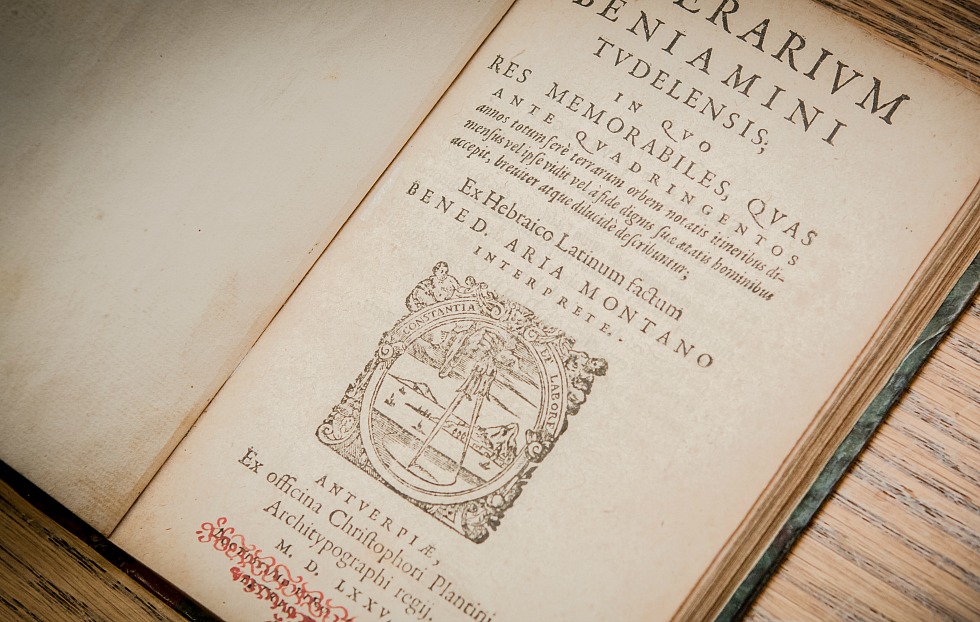500-year-old rare book paints a vivid portrait of life in the 12th Century

McMaster University Library has acquired a rare, centuries-old travelogue that recounts the journey of Benjamin of Tudela, a Jewish merchant whose fantastic journey to Asia predated — by a hundred years — the famous travels of Marco Polo.
At first glance, the book in Myron Groover’s hands appears small and unassuming. But contained within the plain, nondescript cover is a centuries-old text– a rare travelogue that paints a unique and vivid picture of life in the 12th Century.
Recently acquired by McMaster University Library, the text is the first Latin translation of The Travels of Benjamin Tudela, a travelogue originally written in Hebrew by Benjamin of Tudela, a Jewish merchant from the Kingdom of Navarre, now northern Spain.
The book recounts Benjamin’s 13-year journey which, from 1160 to 1173, took him throughout the Mediterranean, the Middle East, and Asia — along many of the same routes that Marco Polo would famously traverse more than a hundred years later.
“It’s a significant travelogue — it’s the accuracy of the detail that really makes this stand out,” says Groover, Archives and Rare Books Librarian at McMaster University Library, who adds that this is one of only a few surviving first hand travelogues from the time.
“Benjamin is a good ethnographer and this is one of our most trustworthy and sophisticated narrative sources for the history and the customs of the places he visited during this time period. It’s a compassionate description that seems to be informed by the people he was writing about — it’s clear he spent time with them and interacted with them.”
Groover says Benjamin, who likely embarked on his journey to develop mercantile contacts, wrote valuable accounts of the people and places he visited, including uncommonly accurate accounts of the vibrant and thriving Jewish communities he encountered, as well as detailed descriptions of powerful and influential urban centres like Baghdad and Constantinople.
“Benjamin is more or less the last person to describe these places to us,” says Groover who explains that Constantinople– the centre of the Byzantine Empire– was burned to the ground in 1204 during the Fourth Crusade, and Baghdad– the cultural capital of the Muslim world– was sacked by the Mongols within 100 years of Benjamin’s narrative.
Groover says although most of the travelogue contains detailed and verifiable information, the exact extent of Benjamin’s voyage is still the subject of debate.
““It’s a bit hard to assess what he says about his eastward journey,” says Groover. “His descriptions of Persia, China, southwestern India and Sri Lanka become increasingly fantastic, but they still serve as a valuable source on how these fabled lands seemed to the imaginations of people living in 12th-century Europe,” he says.
In 1575 – three centuries after Benjamin’s original Hebrew travelogue was written –the text was translated into Latin by Arias Montanus, a Jesuit priest and delegate to the Council of Trent. This translation quickly became a best seller.
“It was a smash success,” says Groover. “It went through several print runs in reasonably rapid succession. People were very keen to read this– most people knew of Marco Polo’s chronicle, but this was written much earlier and is, in many cases, more accurate.”
McMaster University Library’s William Ready Division of Archives and Research Collectionsacquired the book this fall. Groover calls it a “fantastic humanist artifact,” and says it complements McMaster strong collection of books from the renaissance period, as well as the Division’s growing collection of Judaic texts.
“This is a very rare and significant book,” says Groover. “As far as we know, it’s the only one held by a public institution in Canada. We are so pleased that we were able to acquire this book and that we can now can share it with the scholarly community and the public.”

